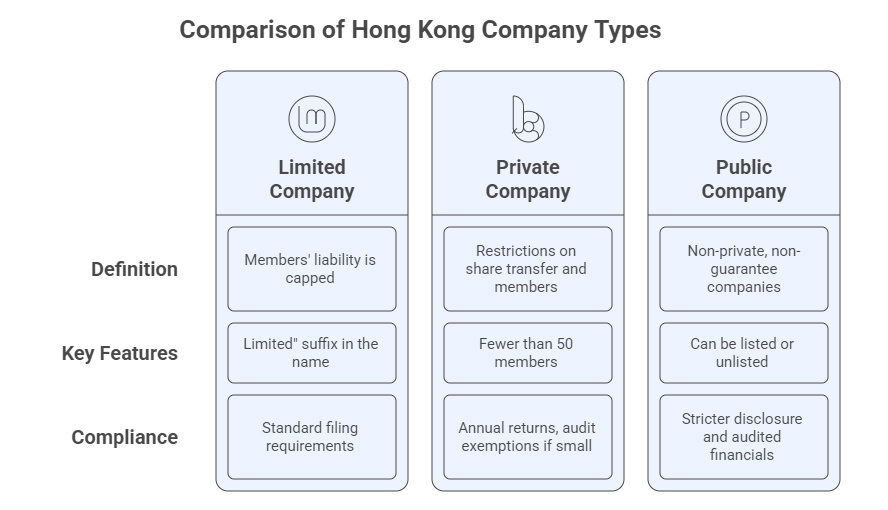Hong Kong’s robust legal framework and strategic position make it a premier hub for international business. Understanding its company structures – particularly distinctions between Limited (Ltd), Private, and Public companies – is essential for compliance, due diligence, and risk management. Drawing from Sections 7-12 and 66 of Hong Kong’s Companies Ordinance (Cap. 622), this guide clarifies critical differences to help you verify business legitimacy and make informed decisions.

I. Core Company Types Under Hong Kong Law
1. Limited Company (Ltd)
- Definition (Sec. 7-10): A company where members’ liability is capped.
- Company Limited by Shares (Sec. 8): Liability restricted to unpaid share amounts (e.g., if shares are 80% paid, maximum exposure is 20%).
- Company Limited by Guarantee (Sec. 9): No share capital; members guarantee fixed sums (typically HKD 1–100) if wound up. Common for nonprofits.
- Key Trait: “Limited” or “有限公司” suffix in company names (Sec. 102).
2. Private Company (Sec. 11)
- Requirements:
- Transfer restrictions on shares.
- ≤50 members (excluding employee shareholders).
- No public share/debenture offerings.
- Use Case: SMEs, family businesses, startups prioritizing control.
- Compliance Note: Must file annual returns but enjoys audit exemptions if “small” (e.g., turnover < HKD 100M).
3. Public Company (Sec. 12)
- Definition: Non-private, non-guarantee companies.
- Listed Public Company: Shares traded on HKEX (e.g., Hang Seng Index firms).
- Unlisted Public Company: Can raise public capital but not stock-exchange listed.
- Obligations: Stricter disclosure, audited financials, and regulatory filings (Sec. 379–388).
II. Unlimited Companies: The Exception (Sec. 10)
- No Liability Cap: Members bear unlimited personal debt liability.
- Rarity: <0.5% of Hong Kong firms (HK CR data, 2023). Used for asset-holding structures.
III. Compliance & Due Diligence Implications
Misidentifying entity types creates legal/financial risks:
| Factor | Limited Co. | Private Co. | Public Co. |
|---|---|---|---|
| Member Liability | Capped | Capped | Capped |
| Share Transfer | Flexible | Restricted | Publicly tradable |
| Public Fundraising | Prohibited | Prohibited | Permitted |
| Disclosure Burden | Low | Moderate | High (SFC oversight) |
Real-World Risks:
- Scam Alerts: Fraudsters may misuse “Public Ltd” labels for fake IPOs. Verify listings via HKEX.
- Contract Pitfalls: Assuming a Private Co. has public liquidity can derail M&A deals.
Example: In 2022, a European investor lost HKD 8M after failing to confirm a supplier’s private status, which restricted asset seizures during bankruptcy.
IV. How to Verify Hong Kong Entities
1. Official Registries:
- Companies Registry (Sec. 27): Access incorporation documents, director lists, and annual returns via e-Search Portal.
- Key Documents:
- Certificate of Incorporation (Sec. 71): Confirms entity type.
- Articles of Association (Sec. 75–80): Details share transfer rules.
2. Due Diligence Tools:
- Enterprise Credit Reports: Validate financials, litigation, and ownership. For comprehensive checks, consider our Hong Kong Company Credit Reports.
- Directorship Checks: Use the Index of Directors (Sec. 647) to uncover hidden risks.
V. Why Structure Matters for Foreign Businesses
- Joint Ventures: Partnering with a Public Ltd may require SFC approvals.
- Debt Recovery: Limited/Private entities offer clearer liability boundaries.
- Compliance: Ignoring Sec. 11 transfer restrictions can void contracts.
Case Study: A U.S. retailer terminated a HKD 12M deal after discovering its HK “partner” was an unlisted public company with undisclosed shareholder disputes. Due diligence could have flagged this via director affidavits (Sec. 646).
Conclusion
Hong Kong’s company types directly impact risk exposure, compliance, and operational freedom. Whether verifying a supplier or structuring a subsidiary, always:
- Cross-check entity status via the Companies Registry.
- Scrutinize Articles of Association for transfer/offering clauses.
- Commission third-party credit reports for high-stakes engagements.
For seamless verification of Hong Kong entities, explore our specialized Company Documents Retrieval services.
